- Home
- Bruce Sterling
Holy Fire Page 2
Holy Fire Read online
Page 2
The young woman was herself, of course.
Martin gazed at the photo, wrapped in mnemonic like a psychic blanket, and then he looked up at her. “Do you remember much about the two of us? It’s been a long time.”
“I can remember,” she told him. That was almost true. “I wouldn’t have come, otherwise.”
“I’ve had a decent life. The thirties, the forties … those were terrible years for most of the world, dark years, awful years, but they were very good years for me. I was working hard, and I knew that it mattered. I had what I wanted, my career, a place in the world, something real to say, and a chance to have my say.… Maybe I wasn’t happy, but I was busy, and that counts for a lot in life. It was hard work and I was glad it was hard work.”
He studied the photo, slowly, meditatively. “But for seven months, back in ’22, the year when I took this picture of you … Well, admittedly, our last two months were pretty bad, but for five months, those first five months we had together, when I loved you and you loved me, and we were young and life was fresh—I was in ecstasy. Those were truly the happiest days of my life. I’ve come to understand that now.”
It seemed wisest to say nothing at this point.
“I married four times. They were no worse than a lot of people’s marriages, but they never really took. My heart wasn’t in it, I suppose. A marriage always seems such a good idea when you’re about to commit one.”
He placed the photo aside on the bed, face up. “I’m very sorry if this is an imposition,” he said, “but to put it into perspective, here at my finale, it’s a very great privilege. To have you here with me now, Mia, physically here, to be able to tell you this straight to your face, with no pride, no spite, no selfish pretense, nothing left to lose or gain between us—it truly eases my mind.”
“I understand.” She paused, reached out. “May I?”
He let her take the picture. The paper behind the glass was crisp and new—he had reprinted the photograph recently, from some old digital source he’d kept on file somewhere, for all these years. The young woman, standing outside in some campus environment, all California palms and rain-stained marble balustrades, looked innocent and excited and ambitious and shallow.
Mia stared very hard at the young woman and felt a profound vacancy where there should have been some primal sense of identity. She and the girl in the picture had eyes of identical color, more or less the same cheekbones, something like the same chin. It was like a picture of her grandmother.
The mnemonic began to affect her. She felt no lift or tingle from the drug but life was slowly enriched with mysterious symbolic portent. She felt as if she were about to tumble into the photograph and land inside it with a splash.
His voice recalled her. “Were you happy with that man you married?”
“Yes. I was happy.” She peeled the emptied sticker from her neck with finicky precision. “It’s long over now, but it did last for many years, and while Daniel and I were a couple, my life was very rich and authentic. We had a child.”
“I’m glad for you.” He smiled again, and this time it was a smile she could recognize. “You look so well, Mia. So much yourself.”
“I’ve been very lucky. And I’ve always been careful.”
He gazed sorrowfully out the window. “You weren’t lucky when you met me,” he said, “and you were right to be careful with me.”
“You don’t have to say that. I don’t regret any of our history.” With deep reluctance, as if handing over a hostage, she gave him the photo again. “I know that we parted badly, but I always followed your work. You were clever, you were very creative. You were never afraid to speak your mind. I didn’t always agree with what you said, but I always felt proud of you. I was proud that I knew you before the rest of the world caught on.” That was true. She was so old that she could still remember when they called that kind of work “films.” Films—long strips of plastic printed with darkness and light. The memory of film, the sense and the substance of the medium of film, brought her a nostalgia sharp as broken glass.
He was insistent. “You were right to break with me. I realized later that it wasn’t about Europe at all, or about a way to change our lives. I only wanted to win that argument, I wanted to carry you off to some other continent and make you live my life.” He laughed. “I never changed. I never learned any better. Not since I was twenty years old. Not since I was five!”
Mia wiped at her eyes. “You could have given me more time for this, Martin.”
“I’m sorry. There’s simply no time left. I’ve faced down everyone else already. You were always the hardest to face.” He offered her a tissue from a drawer in the bedside.
She dabbed at her eyes, and he leaned back, his patterned shoulders denting the pillow. The neck of his pajamas fell open, showing a blood filtration web across his chest. “I’m sorry that I’m better rehearsed than you are, Mia. It was unfair of me to do this; but I’m a dramatist at heart. I’m sorry that I’ve upset you. You can go now, if you like. It was very good to see you.”
“I’m old now, Martin.” She lifted her chin. “I’m not the young woman from that photograph, no matter how well or badly we remember her. You can stage your scene just as it pleases you, I won’t walk out. I’ve never been crass.”
“I plan to die this evening.”
“I see. That soon?”
“Yes. Everything nicely tied up, very civilized, very politic.”
Mia nodded soberly. “I respect and admire your decision. I’ve often thought that I’ll go the very same way.”
He relaxed. “It’s very good of you not to argue with me. Not to spoil my exit.”
“Oh, no. No, I’d never do that.” She reached out and deliberately placed her palm against the chilly back of his hand. “Do you need anything?”
“There are details, you understand.”
“Details. Of course.”
“Heirlooms. Bequests.” He gestured precisely at the empty air. “I have a bequest for you, Mia—something I think is right for you. It’s my memory palace.” A castle in virtual sand. “I want you to take possession of my palace. It can shelter you, if you ever need it. It’s ductile and it’s smart. It’s old, but it’s stable. Sometimes palaces can make a lot of trouble for people, but mine won’t make demands. It’s a good space. I’ve been very discreet with it. I’ve cleaned it out now—except a few things that I couldn’t bear to erase, things very special to me. Maybe to you, too. Mementos.”
“Why did you need such a big palace?”
“That’s a long story.”
Mia nodded a permission, and waited.
“It’s a long story because I had a long life, I suppose. They caught me out back in the sixties, you see. The big net investigations, the financial fraud scandals.” He was enjoying this chance at confession. He was swimming in mnemonic. “I was out of the directing game by that time, but I was very involved in production. I lost a lot of good investments in the legal mess, certain things I’d put aside. I didn’t ever want to get stung again, so I took some serious measures after the sixties. Built myself a serious, genuine palace, the kind the taxmen couldn’t reach. Kept my palace up ever since. A very useful space. But it can’t help me now. The government won’t cut me any exemptions for my liver and my thymus. And the amyloid thing, that’s a syndrome with just one prognosis.”
He frowned. “I hate when people play too fair, don’t you? There’s something nasty happening when there’s so much justice in the world.… They won’t outlaw alcohol, they won’t even outlaw narcotics, but when you go in for a checkup they take your blood and hair and DNA, and they map every trace of every little thing you’ve done to yourself It all goes right on your medical records and gets splashed all over the net. If you live like a little tin saint, then they’ll bend heaven and earth for you. But if you act the way I’ve acted for ninety-six years … Ever see my medical records, Mia? I used to drink a lot.” He laughed. “What’s life without a drink?”
It was, thought Mia, life without cirrhosis, ulcers, and cumulative neural damage.
“The polity. The global polity, it’s like a government run by your grandmother. A wise and kindly little old lady with a plateful of cookies and a headsman’s ax.”
Mia said nothing. She herself had a treatment rating in the ninety-eighth percentile. She was sure that Martin must know this stark and all-important fact about her life. The polity was a government run by, and for the benefit of, people just like herself.
“Martin, tell me about this palace. How can I access it?”
He took her hand, turned it palm up, and steadied it. He traced a touchscreen gesture with a trailing fingertip against her palm. Mia was awash in mnemonic now, and in his withered grip around her wrist she felt an ashen remnant of what had once been, many decades ago, a powerful eroticism. A lover’s touch, rich with youth and heat.
He released her. “Can you remember that passtouch?”
“I’ll remember it. The mnemonic will help me.” She was determined not to nervously rub the wrist that he had gripped. “I like those old gestural systems, I used to use them all the time.”
He handed her his slate. “Here. Set the palace to your thumbprint. No, Mia, the left hand. That one’s better, not on so many records.”
She hesitated. “Why should that bother me?”
“I’ve just given you the key to a fortress. You and I deserve our privacy, don’t we? We both know what life is like nowadays. People like you and me, we’re a lot older than the government is. We can even remember when governments weren’t honest.”
She pressed her left thumb to the slate. “Thank you, Martin. I’m sure your palace is a very great gift.”
“Greater than you know. It can help you with another matter, too.”
“What’s that?”
“My dog.”
She was silent.
“You don’t want poor Plato,” he said, downcast.
She said nothing.
He sighed. “I suppose I should have sold him,” he said. “But that thought was so awful. Like selling a child. I never had a child.… He suffered so much on my behalf, and he’s been through so many changes.… I thought of everyone I knew, but there was no one … among those very few people still alive that I call my friends.… No one I could really trust to take proper care of him.”
“Why me, though? You scarcely know me, these days.”
“Of course I know you,” he muttered. “I know that you’re very careful.… You were the biggest mistake I ever made. Or the biggest mistake that I never made. The regret’s much the same, either way.” He looked up, cajoling her. “Plato never asks for much. He’d be grateful for whatever you gave him. He needs someone. I don’t know what he’ll do, once I’m dead. I don’t know how he’ll take it. He’s so smart, and it costs him so much pain to think.”
“Martin, I’m very flattered that you should choose me, but that’s too much to ask. You just can’t ask that of me.”
“I know that it’s a great deal to ask. But the palace will help you, there are useful resources in there. Can’t you try him for a while? He’s no longer a mere animal. I haven’t allowed him that luxury. You could try for just a while, couldn’t you?” He paused. “Mia, I do know you. I’ve seen your records, and I know more about you than you might imagine. I never forgot you, never. Now, I think that Plato might help you.”
She said nothing. Her heart was beating quickly and oddly and there was a faint whining ring of tinnitus in her left ear. At moments like this she knew with terrible certainty that she was truly old.
“He’s not a monster. He’s just very different, very advanced. He’s worth a lot of money. If you couldn’t bear having him around, you could sell him.”
“I can’t! I won’t!”
“I see. That’s your final word?” A long judgmental moment passed between them, full of intimacy and bitterness. “You can see what I’m like, then, can’t you? Seventy years between the two of us—they’re like one day. I haven’t changed at all. Not me—and not you, either.”
“Martin, I have to be honest with you. It’s just …” She glanced at the dog, lying peacefully in the corner with his narrow canine head on his crossed paws. Then, horrifyingly against her will, the truth began pouring out of her, in jerks. “I don’t have any kind of pets. Never. My life’s not like that anymore. I live alone. I had a family once, I had a husband and a daughter, but they’re gone from my life now and I don’t talk to them. I have a career, Martin, I have a good job in medical research administration. That’s my responsibility, and that’s what I do. I look at screens and I work in economic spaces and I study grant procedures and I weigh results from research programs. I’m a functionary.”
She drew a ragged breath. “I walk in the parks, and I study the news every night, and I always vote. Sometimes I look at old films. But that’s it, that’s everything, that’s how I live. I’m the kind of person you can’t stand, and that you couldn’t ever stand.” She was weeping openly now.
He looked at her with pity. “An animal companion could help you, though. I know that he’s helped me. We owe something to animals, you know. We’ve jumped over the walls of the human condition by climbing on the backs of animals. We’re obliged to our animals.”
“An animal can’t help me. I don’t need any attachments.”
“Take the chance. Change your life a little. People have to take some chances, Mia. You’re not living, if you don’t take some chances.”
“No, I won’t. I know you think this might be good for me, but you’re wrong, it’s not good. I can’t do it. I’m not that kind of person. Stop asking me.”
He laughed. “I can’t believe that you just said that. That’s exactly what you said the very last time we argued—those were your very words!” He shook his head. “All right, all right.… I always ask too much of you, don’t I? It was stupid of me to ask this. I’m full of meddlesome plans for other people who still have lives to live. You don’t like to take chances. I know that. You were always careful, and you were wiser and smarter than me. Bad luck to you that the two of us ever met.”
An empty silence stretched between them. A little foretaste of the silence of death.
He roused himself. “Tell me that you forgive me.”
“I do forgive you, Martin. I forgive you everything. I’m sorry I wasn’t right for you. I never could do what you needed from me. I never gave you what you asked from me. Please forgive me for all that, that was my fault.”
He accepted this. She could see from the flushed look on his pallid face that he’d reached some long-sought apotheosis. He’d said everything that he wanted to say to her. His life was over now. He’d wound it up, packed it away.
“Go your way, darling,” he told her gently. “Someone that I used to be truly loved someone you used to be once. Try not to forget me.”
The dog did not rise to see her to the door. She left Martin’s apartment, numbly retrieving her purse and coat. She walked the vivid summer brightness of the halls. She took an elevator, she entered the chill of the autumnal city. She reentered the thin but very real texture of her thin but very real life. She stepped into the first taxi she found, and she went back home.
Mercedes was in the apartment, cleaning the bathroom. Mercedes came into the front room, carrying her mop and her septic sampling equipment. Mercedes wore her tidy civil-support uniform, baby blue jacket with red epaulets, slacks, and discreetly foam-soled shoes. Mercedes had fifteen elderly women on her civil-support rounds and came by twice a week to tidy up, usually in Mia’s absence. Mercedes called her civil-support work “housekeeping,” because that was a kindlier description than “social worker,” “health inspector,” or “police spy.”
“What’s happened to you?” Mercedes said in surprise, setting down her mop and her bucket of gel. “I thought you were at work.”
“I had a bad experience. A friend is dying tonight.”
Mercedes slid immediately
into a role of professional sympathy. She took Mia’s coat. “Sit down, Mia. I’ll make a tincture.”
“I don’t want a tincture,” Mia said wearily, sitting at the corrugated, lacquered cardboard of her kitchen table. “He made me take a mnemonic. I’m still on it, it’s nasty.”
“What kind?” said Mercedes, tugging off her hairnet and slipping it into her jacket.
“Enkephalokrylline, two hundred fifty micrograms.”
“Oh, that’s just a nothing little mnemonic.” Mercedes fluffed her dark hair. “Have a tincture.”
“I’ll have a mineral water.”
Mercedes rolled Mia’s tincture set to the side of the table and sat on a kitchen stool. She decanted half a liter of distilled water, and methodically set about selecting and crushing dainty little wafers of mineral supplement. Mia’s tincture set was by far the most elaborate and most expensive kitchen fixture that Mia owned. Mia didn’t consider herself a possessive and materialistic person, but she made exceptions for tinctures. Also—to be fair—she was fond of decent clothes. She also made certain exceptions for the cardboard covers of old twentieth-century video-game and CD-ROM products. Mia had a minor weakness for antique paper ephemera.
“I suppose I’d better talk about it,” Mia said. “If I don’t talk to somebody about it, I won’t sleep tonight. I have a checkup in three days and if I don’t sleep tonight it will show.”
Mercedes looked up brightly. “You can talk to me! Of course you can tell me about it.”
“Do you have to put it all in your dossier?”

 Mirrorshades: The Cyberpunk Anthology
Mirrorshades: The Cyberpunk Anthology The Wonderful Power of Storytelling
The Wonderful Power of Storytelling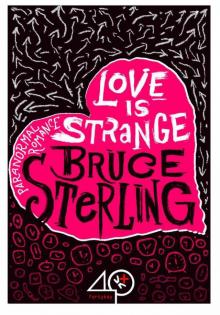 Love Is Strange (A Paranormal Romance)
Love Is Strange (A Paranormal Romance)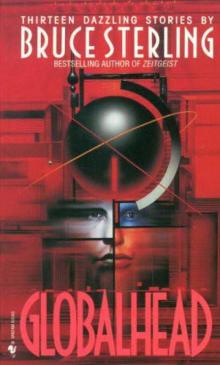 Globalhead
Globalhead Essays. FSF Columns
Essays. FSF Columns The Hacker Crackdown
The Hacker Crackdown Bicycle Repairman
Bicycle Repairman Black Swan
Black Swan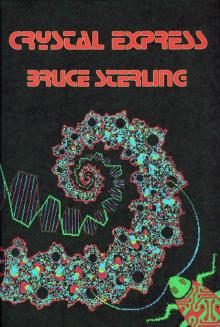 Crystal Express
Crystal Express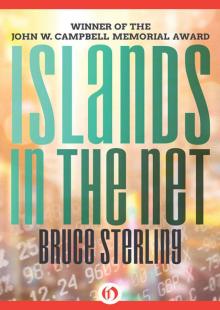 Islands in the Net
Islands in the Net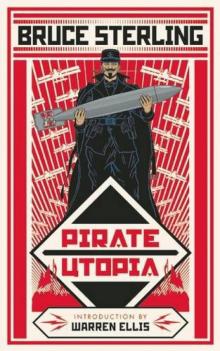 Pirate Utopia
Pirate Utopia GURPS' LABOUR LOST
GURPS' LABOUR LOST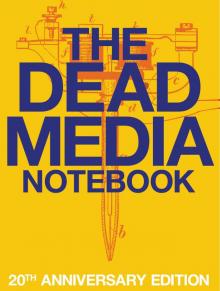 The Dead Media Notebook
The Dead Media Notebook Unstable Networks
Unstable Networks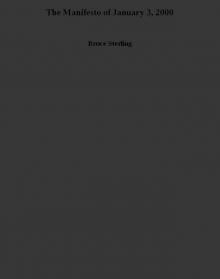 The Manifesto of January 3, 2000
The Manifesto of January 3, 2000 Heavy Weather
Heavy Weather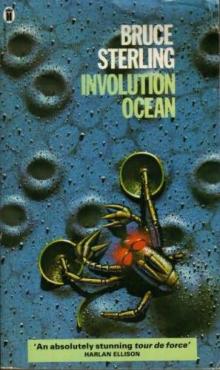 Involution Ocean
Involution Ocean The Epic Struggle of the Internet of Things
The Epic Struggle of the Internet of Things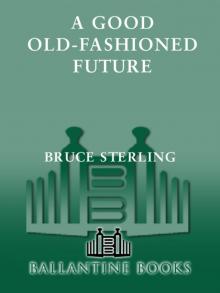 A Good Old-Fashioned Future
A Good Old-Fashioned Future The Littlest Jackal
The Littlest Jackal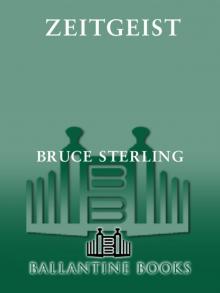 Zeitgeist
Zeitgeist Totem Poles
Totem Poles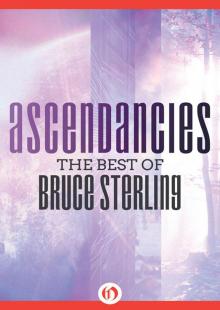 Ascendancies
Ascendancies CyberView 1991
CyberView 1991 War Is Virtual Hell
War Is Virtual Hell Taklamakan
Taklamakan Holy Fire
Holy Fire Cyberpunk in the Nineties
Cyberpunk in the Nineties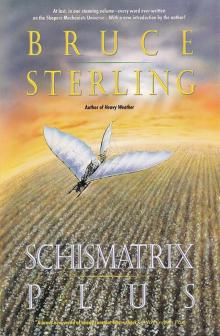 Schismatrix Plus
Schismatrix Plus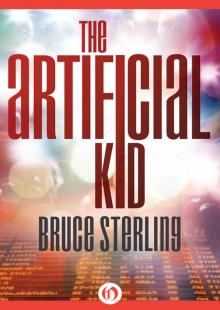 The Artificial Kid
The Artificial Kid Essays. Catscan Columns
Essays. Catscan Columns Maneki Neko
Maneki Neko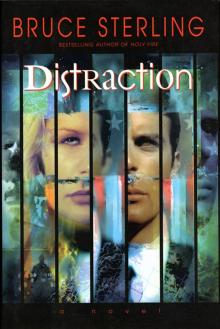 Distraction
Distraction In Paradise
In Paradise Red Star, Winter Orbit
Red Star, Winter Orbit Luciferase
Luciferase